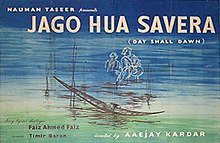The Day Shall Dawn
| The Day Shall Dawn | |
|---|---|

Film poster
|
|
| Directed by | A. J. Kardar |
| Produced by | Noman Taseer |
| Written by |
Manik Bandopadhyay A. J. Kardar |
| Screenplay by | Faiz Ahmed Faiz |
| Story by | Manik Bandopadhyay |
| Starring |
Khan Ataur Rahman Tripti Mitra Zurain Rakshi Kazi Khaliq Maina Latif |
| Music by | Timir Baran Shantikumar Charthedee |
| Cinematography | Walter Lassally |
| Edited by | Ms. Binvovet |
|
Release date
|
|
|
Running time
|
87 minutes |
| Country | Pakistan |
| Language | Urdu Bengali |
The Day Shall Dawn (Urdu: Jago Hua Savera) is a 1959 Pakistani drama film directed by A. J. Kardar. The film was selected as the Pakistani entry for the Best Foreign Language Film at the 32nd Academy Awards, but was not accepted as a nominee. It was also entered into the 1st Moscow International Film Festival where it won a Golden Medal.
The Day Shall Dawn was very much a co-production between the two halves of what was then a geographically divided Pakistani state (now independent Pakistan and Bangladesh). The film was shot in Dhaka, East Pakistan (contemporary Bangladesh) by the East Pakistan Film Development Corporation by a director from Lahore (in West Pakistan) and scripted in the Urdu language, which is native to the West. He selected Zahir Raihan as assistant director of the film. The film's music was provided by prominent Indian composer Timir Baran.
The depicts about the daily lives of East Pakistani fishermen in the village of Saitnol (near Dhaka) and their struggles with loan sharks. The script was inspired by an original story by Bengali author Manik Bandopadhyay. According to Indian film critic Saibal Chatterjee, it is the only known neo-realist film produced in Pakistan at that time.
Just days before the film was to premier, the new government of Pakistan (under Ayub Khan) asked the film's producer, Nauman Taseer not to release the film. The writer, Faiz Ahmad Faiz, was later imprisoned by the government for his communist beliefs. Actress Tripti Mitra and her husband Sombhu Mitra were also politically left-leaning, and members of the leftist Indian People's Theatre Association in the 1940s. When the film did premier in London, members of Pakistan's High Commission to the United Kingdom disobeyed instructions from the Pakistani government not to attend.
...
Wikipedia
